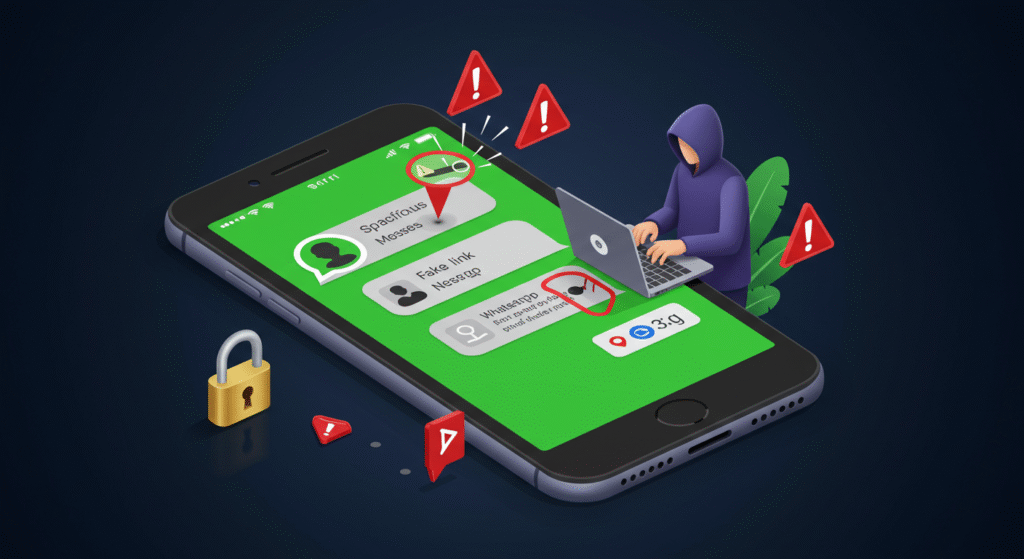PTA issues warning on rising WhatsApp phishing scams. Learn red flags, prevention tips, and how to stay safe from WhatsApp phishing scams.
Introduction WhatsApp phishing scams
Because of increase in phishing scams now the PTA issues warning: how to stay safe from WhatsApp phishing scams. Pakistan Telecommunication Authority (PTA) has raised a red flag against a skyrocketing number of WhatsApp phishing cases among the population. These are destructive activities usually masqueraded as authoritative messages, meant to deceive the user to open and use fraudulent links, which may result in loss of information, compromise of accounts, and loss of money. The alarm is posted at the time, when the number of such fraudulent incidents has multiplied exponentially, making the development of both high rates of awareness and strong cybersecurity practices vital.
How Phishing Tricks Work
Phishing is a form of cybercrime, in which scammers impersonate an authorized party such as in this instance, usually WhatsApp itself or a government agency such as the PTA to defraud people into providing sensitive data. These scams work quite well on WhatsApp since it uses the credibility of an intimate communication service. Fraudsters tend to employ advanced strategies in order to come across as authentic.
The most frequent type of this scam includes a message stating that your WhatsApp account has been in breach of some rules or is going to be suspended. This will look like a message containing a link that you are supposed to click to verify your account or update your information and even contain the official WhatsApp logo. Other common scams are those about the PTA and its Device Identification Registration and Blocking System (DIRBS), which say that your SIM or phone is a suspect and threatens to block it, unless you follow a link.
Such fraudulent links cause counterfeit sites that resemble the official platform. After filling in your personal information (like credit card number, passwords or even a two factor authentication code), the scammers take control of your accounts. These frauds do not only involve hijacking of your account, they are also applicable in installing a malware or spyware on your computer so that the criminals can get full access to your information.

Red Flags to a Phishing Scam
The first step to remaining safe is the ability to recognize a scam. According to the PTA and cybersecurity experts, these red flags are to be sought by users:
1. Sense of Urgency
Scammers are likely to put an illusion of panic or urgency and use words such as act now, your account will be suspended or click now. It is a typical trick of bullying you into misjudging.
2. Suspicious Links
It is good to verify the URL of any links before clicking them. Slightly modified URLs that appear similar to the official ones (e.g., whatsapp-web.com, as opposed to web.whatsapp.com) are frequently used by scammers. The links also can be abridged concealing the actual destination.
3. Spelling and Grammatical Wave
Phishing messages may include typing mistakes, bad grammar or clumsy wording. Although all people are prone to errors, the message sent in an authoritative company or organization is supposed to be professionally written.
4. Demands of Personal Information
We will never request your passwords, PINs, or financial information over a message via legitimate organizations, such as WhatsApp and the PTA. Do not disclose your verification code or two step verification PIN to anyone.
5. Unknown Number Messages
Not all unknown numbers messages are spams, but an unsolicited message, which seems out of the blue, that is based on a foreign country code, must be given the highest level of caution.
6. Too Good to Be True
Be very wary of messages that promise free money, jobs that do not require experience or special offers. And when it sounds like there is something wrong with it, it is almost certainly the case.
Being Safe and Keeping Your Data
Do Not Use Suspicious Links
This is the greatest rule. Do not click on any suspicious link in case you have received a message. One should always prefer visiting the official site or application.
Turn on Two-Step Verification
Two-step Verification (2FA) is an important security option that is available in WhatsApp. It will need a six-digit PIN which you make, which will be required whenever registering your phone number on a new phone. This implies that although a scammer may obtain your SMS verification code, they will not be able to log into your account without your PIN.
Check the Identity of a Sender
When an e-mail message is purported to have been sent by a friend or a relative requesting money or personal details, then corroborate the identity of the sender via a different communication platform, say a phone call. Fraudsters usually intrude into accounts and pose as acquaintances.
Block and Report
To report a phishing scam, block the number and report the incident to WhatsApp. The report to the user assists the team of WhatsApp to research and act on the fake accounts.
Update Your Privacy
Change and review your privacy settings to determine who can view your profile picture, status, and the last seen information. This can be saved and shared only with the people you know so that scammers do not collect information to carry out social engineering.
Keep Your Apps Current
Make sure you keep WhatsApp up to date. Security patches that are included with an update of the app usually address the new vulnerabilities.
Conclusion
The warning issued by the Pakistan Telecommunication Authority (PTA) regarding WhatsApp phishing scam is an essential notification to the people. The real effects of these scams, which capitalise on trust and a feeling of urgency, are often underestimated by the victims since they can go beyond the loss of money to ill health of the soul. This threat must be tackled on a multi-faceted basis. At the personal level, users should be aware and take the initiative to spot red flags such as suspicious links and requesting personal data, as well as activating security settings, such as two-step verification. At a larger level, the cooperation between the PTA and law enforcement organizations will be necessary to break the criminal organization of these scams. Through an enforced policy of awareness and powerful legal and regulatory enforcement, Pakistan will be in a position to establish a safer online space and secure its citizens against this widespread cyber menace.



